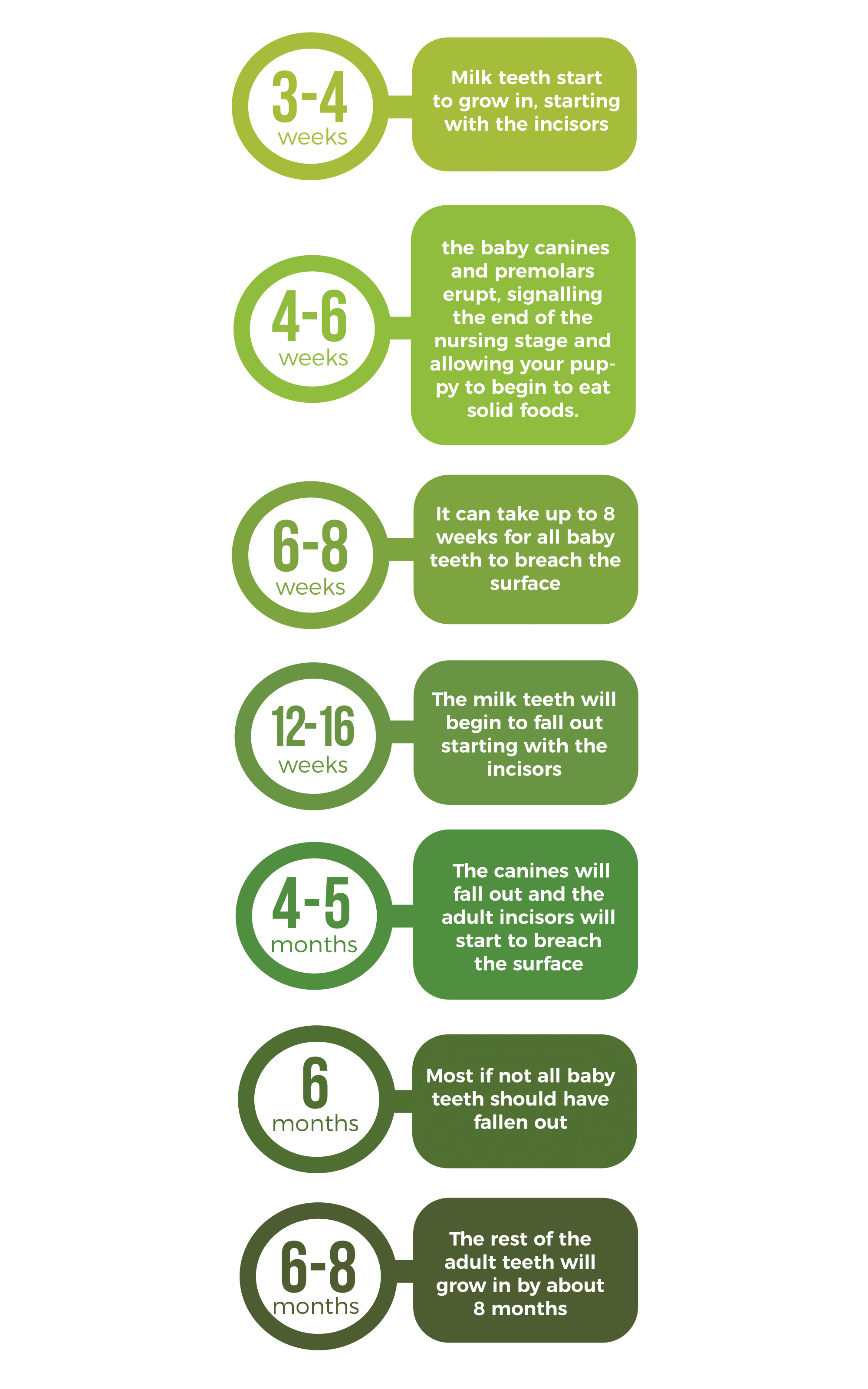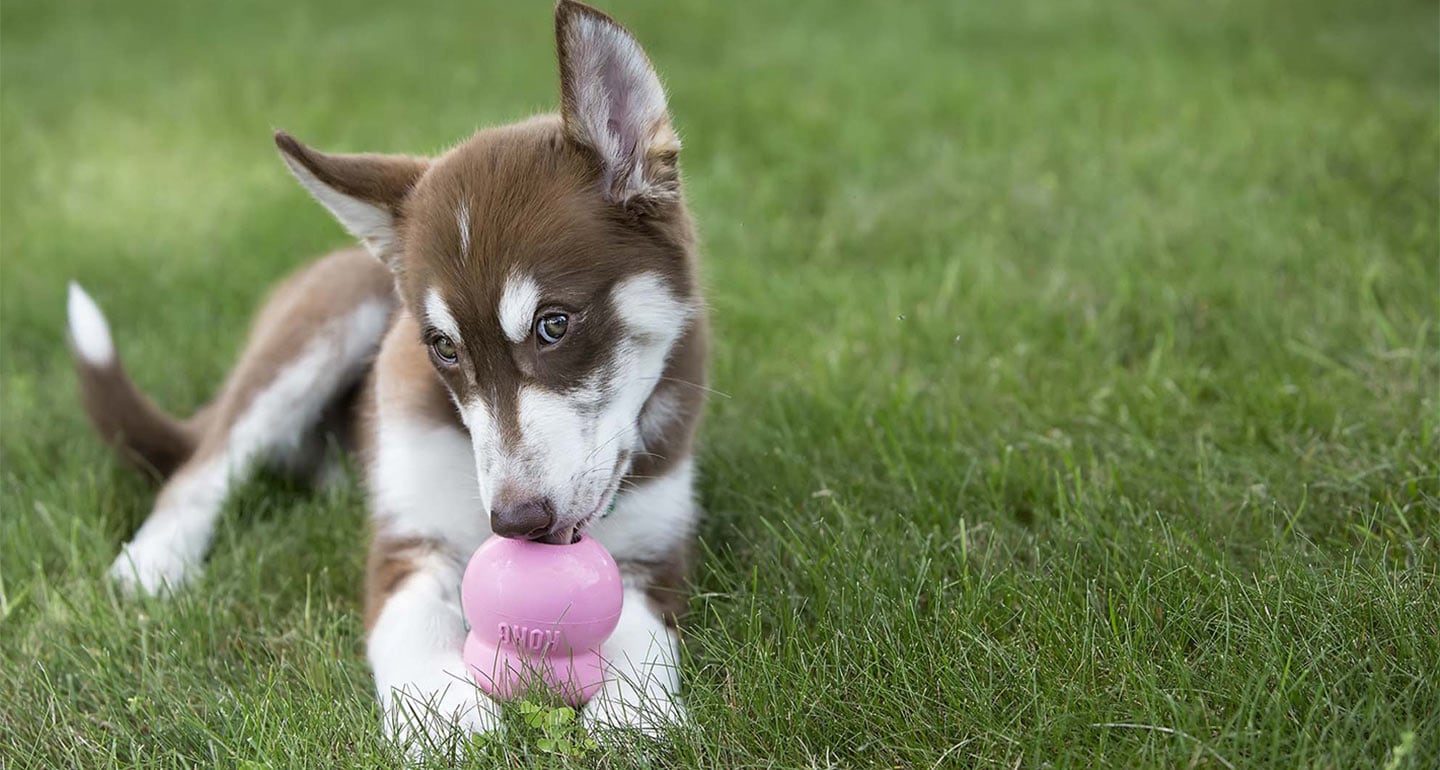
The second set of teeth will grow in place of the lost teeth within a couple of weeks. While playing with your dog you may see spaces or gaps between his teeth and then realize that he is missing teeth.

A puppy will teeth until he is around 6- or 7-months-old and during that time you should be managing the symptoms and teaching.
Puppy losing teeth symptoms. Puppy Teething Symptoms. So how can you tell if your puppy is teething. Once your pup is 3 or 4 months old keep an eye out for these puppy teething symptoms.
Dont freak out if you spot a little blood on your puppys fave chew toys its normal and wont hurt them. Dog-Version of Baby Teeth. Just like with human babies your fur babies teeth fall.
Finally one of the most common symptoms of puppy teething is visible lost teeth. Just like with humans dogs lost teeth may be easy to find. For example if your puppy chews frequently on her favorite toy look for her baby teeth to be left behind in it after a good chewing session.
These are not your normal puppy teething symptoms but Ive included them here because they are somewhat common in small breed dogs. If you see what appears to be extra teeth there is a good chance that the dog has retained a baby tooth. This is notoriously common in small breed dogs.
If the baby tooth does not fall out eventually the. Chewing is just one of the dog teething symptoms you may notice as your new puppy is losing her puppy teeth and growing in her adult teeth. She will chew on the puppy teething toys you offer her and she will chew your shoes and any other fun items she can find.
Puppies develop and lose this set of baby teeth just like humans do. These teeth sometimes known as milk teeth or needle teeth and referred to as deciduous teeth by vets eventually give way to permanent adult teeth. The first deciduous teeth are usually lost at about 4 months of age Dr.
A retained baby tooth can cause damage to the permanent tooth. If the baby tooth isnt pulled in a timely manner the adult tooth could grow in crooked causing it to be in an incorrect position in the puppys mouth. This could cause him difficulty eating pain in his mouth and a variety of other problems.
It is therefore at the first signs such as the presence of tartar or bleeding gums that you must react if you want your dog to keep his teeth and not become seriously ill. Prevent tooth loss in adult dogs. As soon as the dog loses a tooth it must be considered as a serious matter since it is mainly due to periodontitis which can lead in the medium term to serious.
A notable side effect of teething in puppies is bad breath. Although your puppys breath might never smell like flowers during the teething stage the sweet and sour smell emerging from his mouth is especially potent. This is because your puppys bleeding gums and the warm moist environment of his mouth form the ideal place for bacteria to thrive.
One thing you may not have noticed about your puppy is that the adult teeth may be coming in behind the puppy teeth and you just dont see. One thing you may not have noticed about your puppy is that the adult teeth may be coming in behind the puppy teeth and you just dont see them yet. When the adult teeth come in they will push out the little puppy teeth.
Sometimes a puppy tooth will stubbornly stay in place even when the adult tooth is fully emerged behind it. While playing with your dog you may see spaces or gaps between his teeth and then realize that he is missing teeth. There are a variety of reasons that your dog can be missing teeth such as.
Canine distemper as a puppy. Wrong type of chew toys. Puppy owners may also notice blood spots on toys bedding or anything else that a puppy has had in their mouth from where a tooth is coming lose where a tooth has fallen out or where a permanent tooth is coming in.
In addition to the obvious symptom of chewing there are other signs that indicate your puppy is likely in an active stage of teething. Drooling and foul breath are common during teething. You may see spots of blood on items your puppy chews.
As the teeth erupt through the gums there is often some bleeding. When teething occurs you might notice the puppy drooling or see little spots of blood on his toys although if you notice anything unusual talk to your veterinarian since both symptoms could. If your puppy has lost a couple of its teeth then this is not cause for alarm.
The second set of teeth will grow in place of the lost teeth within a couple of weeks. During this time you can ease teething pain by purchasing a special teething chew toy for your dog. Older dogs can have canine tooth loss for a number of reasons.
Teething symptoms in puppies include first and foremost the obvious a loss of teeth. Aside from the obvious sore gums and loss of teeth symptoms can also be more serious such as lethargy vomiting and diarrhea. When Do Puppy Teeth Fall Out.
Puppies start to lose their milk teeth when theyre between 12 and 16 weeks old. Unlike in humans the roots of the puppy teeth are reabsorbed back into the gum and then the adult tooth pushes whats left of the tooth out as it erupts from the gum. By this time they will probably be home with you so youll probably notice them showing.
Most puppies will get their permanent teeth as soon as the baby teeth begin falling out. The latter as said earlier is usually between 12 to 16 weeks though it may happen later or earlier for some pups. The incisors appear first followed shortly by the canine then the premolars and finally the molars.
Puppy teething symptoms can oftentimes bring about troublesome activities mistaken disguised as bad behavior such as nipping and chewing. These behaviors although common are signs of teething and can be managed using a few simple techniques. A puppy will teeth until he is around 6- or 7-months-old and during that time you should be managing the symptoms and teaching.
Normal Tooth Loss in Puppies. A loose tooth is not always something to worry about it is normal for puppies as they age to lose teeth. Puppies are born toothless and remain so for the first weeks of life.
At three to five weeks of age the puppies baby teeth also called deciduous teeth begin to emerge. If you notice loose or missing teeth bleeding gums or bad dog breath have your dog examined by a veterinarian as soon as possible. Periodontal disease can be painful and make it.
Your dog may be missing one or more teeth as a result of the tooth or teeth not being formed having formed improperly or having never come in. More commonly a tooth or teeth may be missing due to periodontal disease or as a result of trauma or a previous surgical extraction. Vet bills can sneak up on you.